Burt A. The Evolution of the British Empire and Commonwealth From the American Revolution
Подождите немного. Документ загружается.

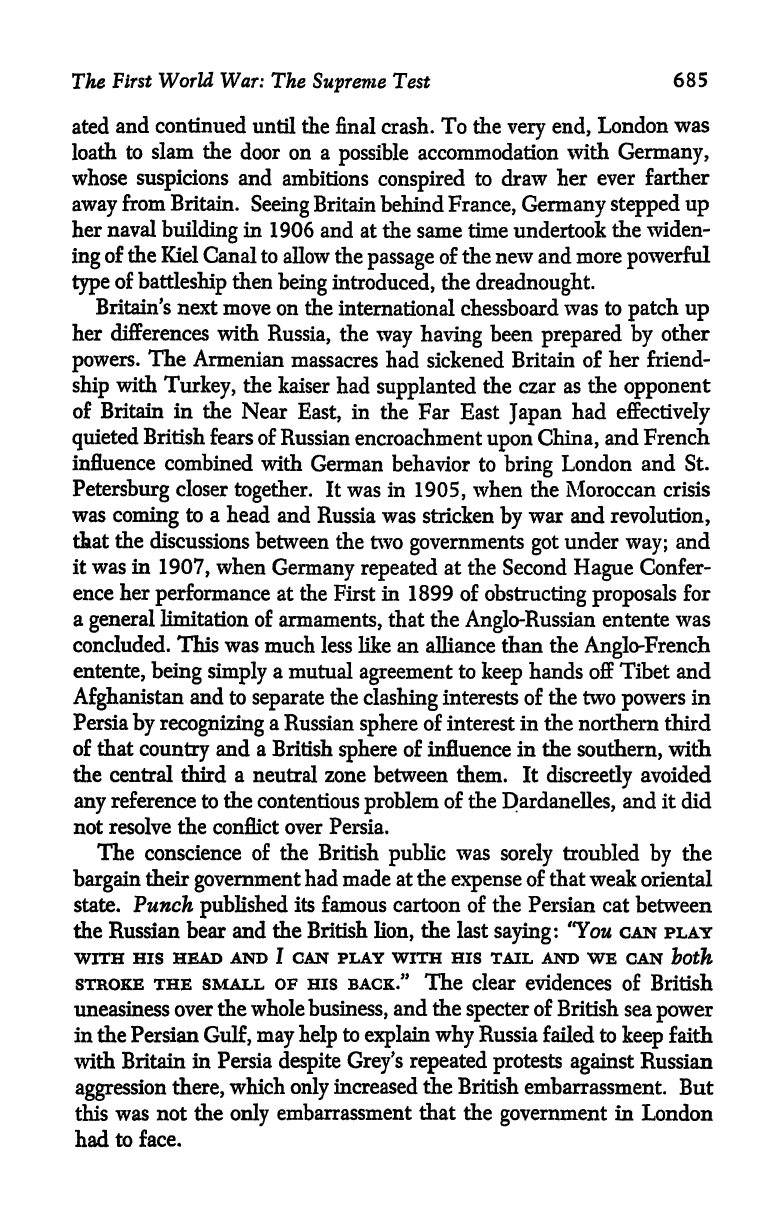
The
First
World
War:
The
Supreme
Test
685
ated
and continued
until
the
final crash.
To the
very
end,
London
was
loath
to
slam the
door
on
a
possible
accommodation
with
Germany,
whose
suspicions
and
ambitions
conspired
to draw
her
ever
farther
away
from
Britain.
Seeing
Britain
behind
France,
Germany stepped
up
her
naval
building
in
1906
and
at the same
time
undertook
the
widen-
ing
of
the Kiel
Canal to
allow the
passage
of
the new and
more
powerful
type
of
battleship
then
being
introduced,
the
dreadnought.
Britain's
next
move
on
the
international
chessboard
was
to
patch
up
her differences
with
Russia,
the
way
having
been
prepared
by
other
powers.
The
Armenian
massacres
had sickened
Britain of
her friend-
ship
with
Turkey,
the
kaiser
had
supplanted
the czar
as the
opponent
of
Britain
in the
Near
East,
in
the Far
East
Japan
had
effectively
quieted
British
fears
of
Russian
encroachment
upon
China,
and
French
influence
combined with
German behavior to
bring
London
and St.
Petersburg
closer
together.
It
was in
1905,
when
the
Moroccan crisis
was
coming
to
a
head and
Russia was stricken
by
war
and
revolution,
that
the
discussions
between the two
governments got
under
way;
and
it
was
in
1907,
when
Germany
repeated
at the
Second
Hague
Confer-
ence her
performance
at the
First
in
1899 of
obstructing
proposals
for
a
general
limitation
of
armaments,
that the
Anglo-Russian
entente was
concluded.
This was
much less like an
alliance
than the
Anglo-French
entente,
being
simply
a
mutual
agreement
to
keep
hands off
Tibet and
Afghanistan
and
to
separate
the
clashing
interests of
the
two
powers
in
Persia
by
recognizing
a
Russian
sphere
of
interest in the northern
third
of
that
country
and
a
British
sphere
of
influence
in the
southern,
with
the
central
third
a
neutral
zone
between
them.
It
discreetly
avoided
any
reference to the contentious
problem
of the
Dardanelles,
and
it
did
not
resolve
the
conflict
over Persia.
The
conscience
of the
British
public
was
sorely
troubled
by
the
bargain
their
government
had
made
at
the
expense
of
that
weak
oriental
state. Punch
published
its
famous cartoon
of
the
Persian
cat between
the Russian bear and
the British
lion,
the
last
saying:
"You
CAN
PLAY
WITH
HIS
HEAD AND
I CAN PLAY WITH HIS
TAIL
AND
WE
CAN
both
STROKE THE
SMALL
OF
HIS
BACK."
The
clear
evidences
of
British
uneasiness over
the whole
business,
and the
specter
of
British sea
power
in the Persian
Gulf,
may
help
to
explain why
Russia
failed to
keep
faith
with
Britain in
Persia
despite
Grey's
repeated protests
against
Russian
aggression
there,
which
only
increased the British
embarrassment.
But
this was
not the
only
embarrassment
that
the
government
in
London
had
to face.
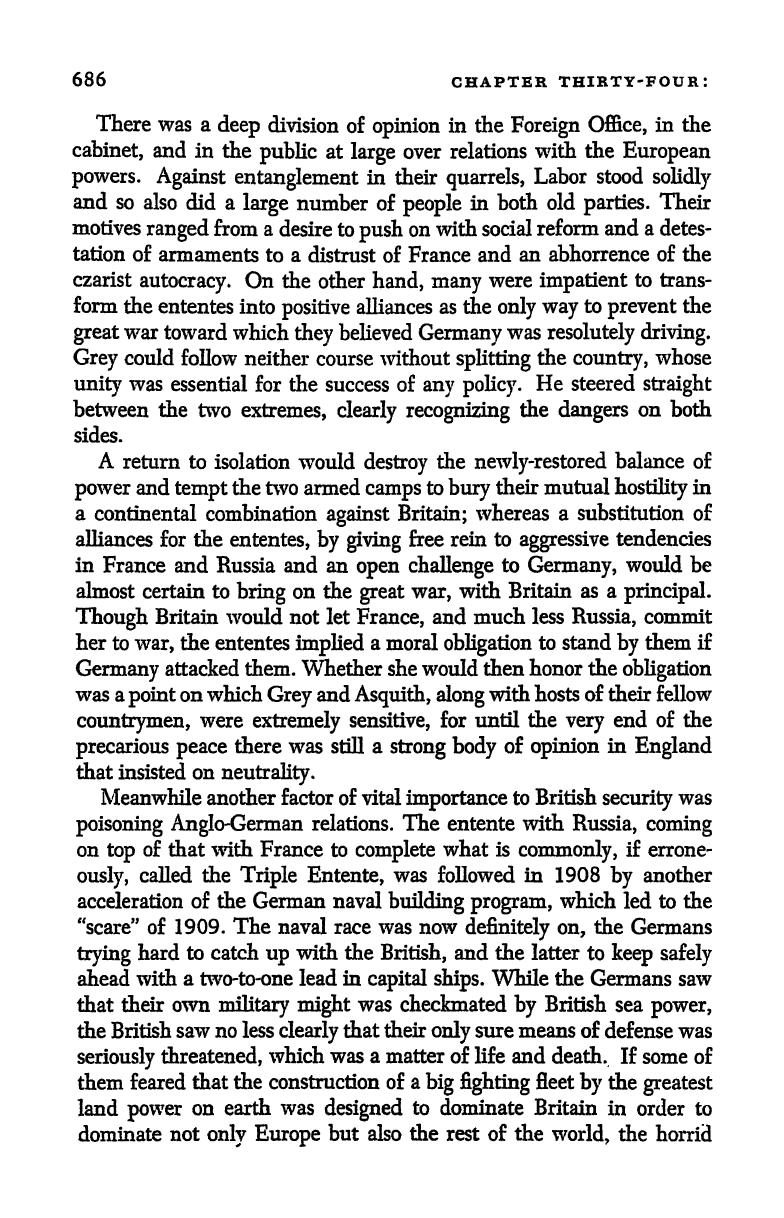
686
CHAPTER
THIRTY-FOUR:
There
was
a
deep
division
of
opinion
in the
Foreign
Office,
in
the
cabinet,
and
in the
public
at
large
over
relations
with the
European
powers.
Against
entanglement
in their
quarrels,
Labor stood
solidly
and
so
also
did
a
large
number of
people
in
both
old
parties.
Their
motives
ranged
from
a
desire to
push
on
with social
reform
and
a
detes-
tation of
armaments
to
a
distrust
of
France
and
an abhorrence
of the
czarist
autocracy.
On
the
other
hand,
many
were
impatient
to trans-
form
the
ententes into
positive
alliances
as
the
only
way
to
prevent
the
great
war
toward which
they
believed
Germany
was
resolutely
driving.
Grey
could
follow
neither course
without
splitting
the
country,
whose
unity
was
essential for the
success
of
any policy.
He
steered
straight
between
the
two
extremes,
clearly recognizing
the
dangers
on
both
sides.
A
return
to
isolation would
destroy
the
newly-restored
balance
of
power
and
tempt
the two armed
camps
to
bury
their mutual
hostility
in
a
continental
combination
against
Britain;
whereas a
substitution
of
alliances for
the
ententes,
by
giving
free rein to
aggressive
tendencies
in
France and Russia and an
open
challenge
to
Germany,
would be
almost certain to
bring
on
the
great
war,
with
Britain
as a
principal.
Though
Britain
would
not
let
France,
and
much less
Russia,
commit
her
to
war,
the
ententes
implied
a
moral
obligation
to stand
by
them if
Germany
attacked
them.
Whether
she
would
then honor
the
obligation
was a
point
on
which
Grey
and
Asquith,
along
with
hosts
of
their
fellow
countrymen,
were
extremely
sensitive,
for
until the
very
end of
the
precarious
peace
there was still
a
strong
body
of
opinion
in
England
that
insisted
on
neutrality.
Meanwhile another factor
of
vital
importance
to British
security
was
poisoning Anglo-German
relations.
The entente with
Russia,
coming
on
top
of that with
France
to
complete
what is
commonly,
if
errone-
ously,
called the
Triple
Entente,
was
followed
in
1908
by
another
acceleration of
the
German naval
building program,
which
led to
the
"scare"
of 1909.
The
naval
race
was
now
definitely
on,
the
Germans
trying
hard
to catch
up
with the
British,
and the
latter
to
keep
safely
ahead
with
a
two-to-one
lead in
capital
ships.
While the
Germans saw
that
their
own
military might
was
checkmated
by
British
sea
power,
the British
saw no less
clearly
that their
only
sure
means
of
defense was
seriously
threatened,
which was
a
matter
of life and
death. If
some of
them
feared
that
the
construction of
a
big
fighting
fleet
by
the
greatest
land
power
on earth
was
designed
to dominate Britain
in
order to
dominate
not
only
Europe
but
also
the
rest of the
world,
the
horrid
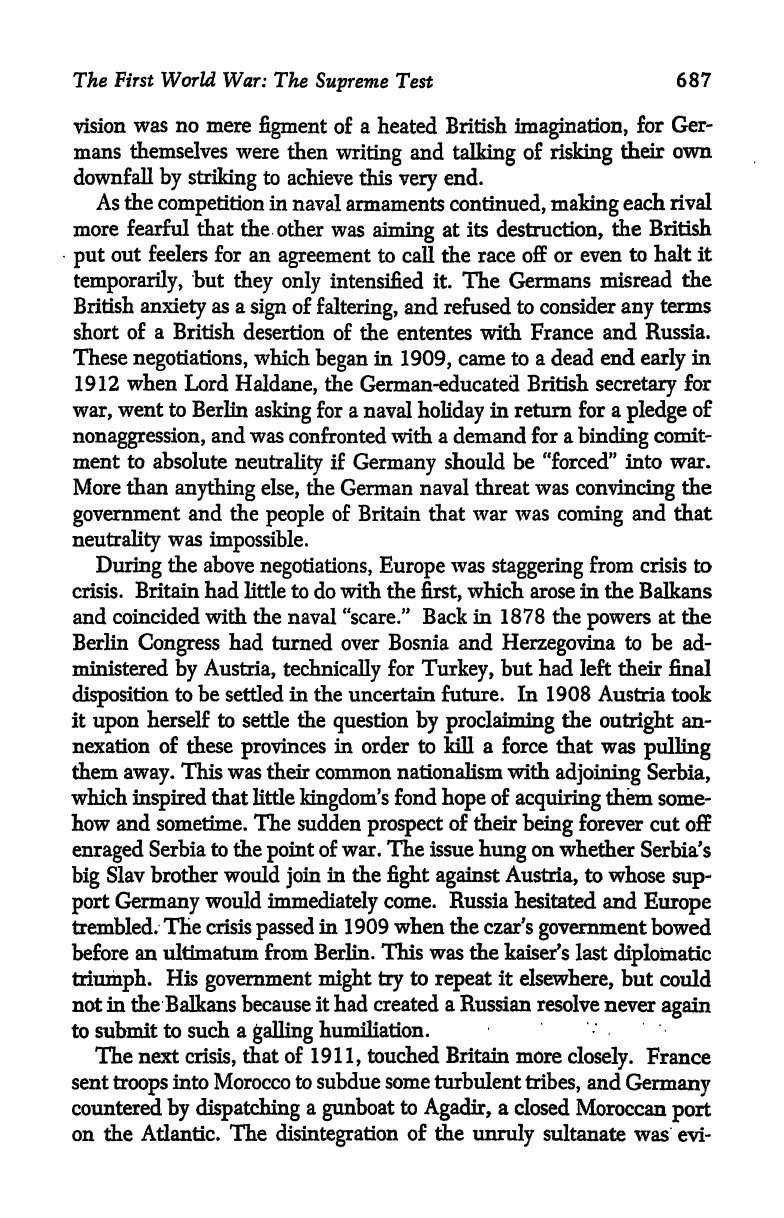
The
First World War:
The
Supreme
Test
687
vision
was no
mere
figment
of
a
heated
British
imagination,
for
Ger-
mans
themselves
were
then
writing
and
talking
of
risking
their
own
downfall
by
striking
to
achieve this
very
end.
As
the
competition
in
naval
armaments
continued,
making
each
rival
more
fearful that
the
other
was
aiming
at
its
destruction,
the
British
put
out
feelers
for an
agreement
to call the
race off
or
even
to halt it
temporarily,
but
they
only
intensified
it.
The
Germans
misread
the
British
anxiety
as a
sign
of
faltering,
and
refused to consider
any
terms
short
of
a
British
desertion of
the ententes
with France
and Russia.
These
negotiations,
which
began
in
1909,
came to
a
dead
end
early
in
1912
when
Lord
Haldane,
the
German-educated
British
secretary
for
war,
went to
Berlin
asking
for
a
naval
holiday
in return for a
pledge
of
nonaggression,
and was
confronted
with a demand for
a
binding
comit-
ment
to
absolute
neutrality
if
Germany
should
be
"forced" into
war.
More
than
anything
else,
the
German
naval
threat
was
convincing
the
government
and the
people
of Britain that
war
was
coming
and that
neutrality
was
impossible.
During
the
above
negotiations,
Europe
was
staggering
from crisis to
crisis.
Britain
had little to
do with the
first,
which
arose in
the Balkans
and
coincided
with the
naval "scare."
Back in
1878
the
powers
at
the
Berlin
Congress
had turned over
Bosnia
and
Herzegovina
to be
ad-
ministered
by
Austria,
technically
for
Turkey,
but
had left their
final
disposition
to
be
settled
in the uncertain future. In
1908
Austria
took
it
upon
herself
to settle
the
question
by proclaiming
the
outright
an-
nexation of
these
provinces
in
order to
kill a
force that
was
pulling
them
away.
This was their common nationalism
with
adjoining
Serbia,
which
inspired
that little
kingdom's
fond
hope
of
acquiring
them
some-
how
and sometime. The sudden
prospect
of their
being
forever
cut
off
enraged
Serbia
to
the
point
of
war. The issue
hung
on
whether
Serbia's
big
Slav
brother would
join
in
the
fight against
Austria,
to whose
sup-
port
Germany
would
immediately
come.
Russia
hesitated
and
Europe
trembled.
The
crisis
passed
in 1909
when the czar's
government
bowed
before an
ultimatum from Berlin.
This
was the
kaiser's last
diplomatic
triumph.
His
government
might
try
to
repeat
it
elsewhere,
but
could
not in the Balkans because
it
had
created
a
Russian
resolve never
again
to submit
to
such
a
galling
humiliation.
The next
crisis,
that of 191
1,
touched Britain
more
closely.
France
sent
troops
into Morocco to subdue
some
turbulent
tribes,
and
Germany
countered
by dispatching
a
gunboat
to
Agadir,
a
closed
Moroccan
port
on
the
Atlantic. The
disintegration
of the
unruly
sultanate
was
evi-
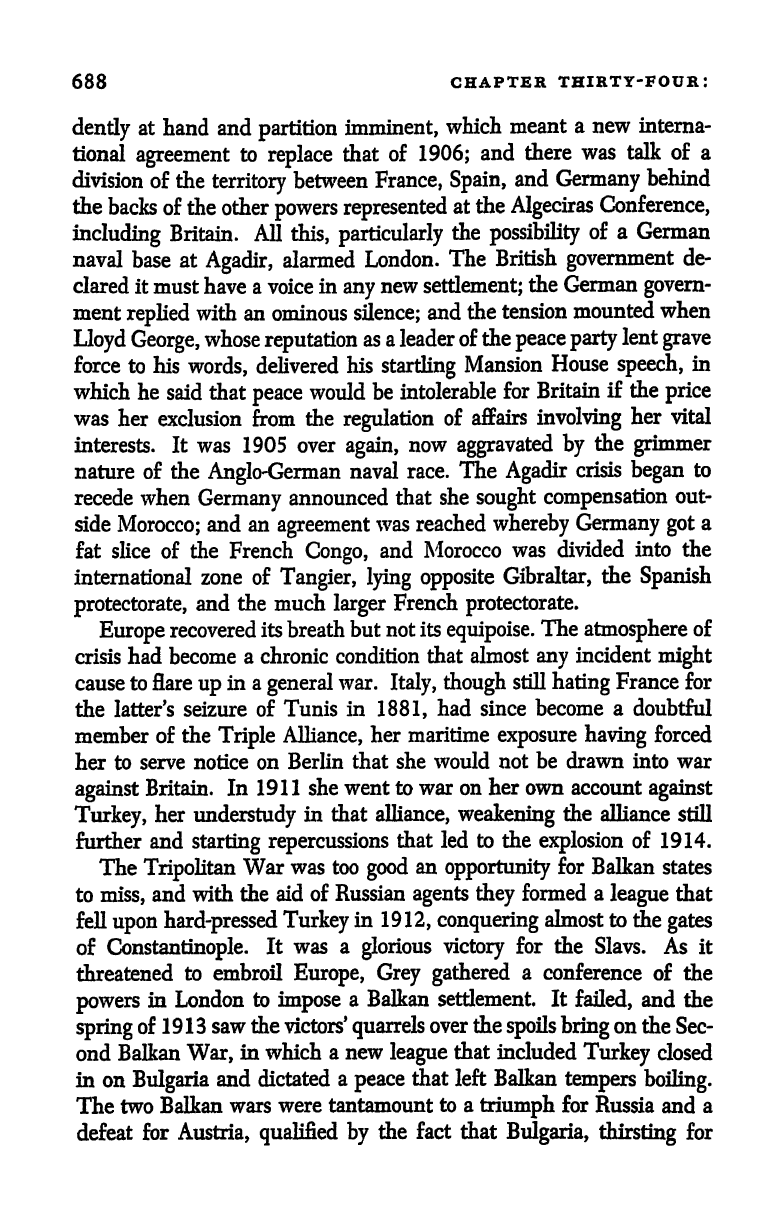
688
CHAPTER
THIRTY-FOUR:
dendy
at
hand and
partition
imminent,
which
meant
a new interna-
tional
agreement
to
replace
that
of
1906;
and
there
was talk of
a
division
of the
territory
between
France,
Spain,
and
Germany
behind
the
backs
of the
other
powers
represented
at
the
Algeciras
Conference,
including
Britain. All
this,
particularly
the
possibility
of
a German
naval
base
at
Agadir,
alarmed
London.
The
British
government
de-
clared it
must have a
voice
in
any
new
settlement;
the German
govern-
ment
replied
with an
ominous
silence;
and
the
tension
mounted
when
Lloyd
George,
whose
reputation
as
a
leader
of
the
peace
party
lent
grave
force
to
his
words,
delivered
his
startling
Mansion
House
speech,
in
which he
said
that
peace
would be
intolerable
for
Britain
if the
price
was
her
exclusion
from
the
regulation
of
affairs
involving
her
vital
interests. It
was
1905
over
again,
now
aggravated
by
the
grimmer
nature of
the
Anglo-German
naval
race.
The
Agadir
crisis
began
to
recede when
Germany
announced
that
she
sought
compensation
out-
side
Morocco;
and
an
agreement
was
reached
whereby
Germany
got
a
fat
slice of
the
French
Congo,
and
Morocco
was divided
into the
international zone of
Tangier,
lying
opposite
Gibraltar,
the
Spanish
protectorate,
and the much
larger
French
protectorate.
Europe
recovered
its breath
but not its
equipoise.
The
atmosphere
of
crisis had
become
a chronic condition
that almost
any
incident
might
cause
to flare
up
in
a
general
war.
Italy, though
still
hating
France for
the latter's
seizure of
Tunis
in
1881,
had since
become
a
doubtful
member of the
Triple
Alliance,
her
maritime
exposure
having
forced
her to
serve
notice on
Berlin
that she would
not
be
drawn into
war
against
Britain. In
1911
she
went
to
war on her
own
account
against
Turkey,
her
understudy
in that
alliance,
weakening
the
alliance
still
further
and
starting
repercussions
that led
to
the
explosion
of
1914.
The
Tripolitan
War
was
too
good
an
opportunity
for Balkan
states
to
miss,
and
with the
aid
of Russian
agents
they
formed
a
league
that
fell
upon
hard-pressed
Turkey
in
1912,
conquering
almost
to
the
gates
of
Constantinople.
It
was
a
glorious
victory
for
the Slavs.
As
it
threatened
to embroil
Europe,
Grey gathered
a
conference
of the
powers
in London
to
impose
a Balkan settlement. It
failed,
and the
spring
of
1913
saw the victors'
quarrels
over the
spoils
bring
on
the Sec-
ond
Balkan
War,
in
which
a
new
league
that
included
Turkey
closed
in on
Bulgaria
and dictated
a
peace
that
left Balkan
tempers
boiling.
The two
Balkan
wars
were
tantamount
to
a
triumph
for
Russia
and
a
defeat
for
Austria,
qualified
by
the
fact
that
Bulgaria,
thirsting
for
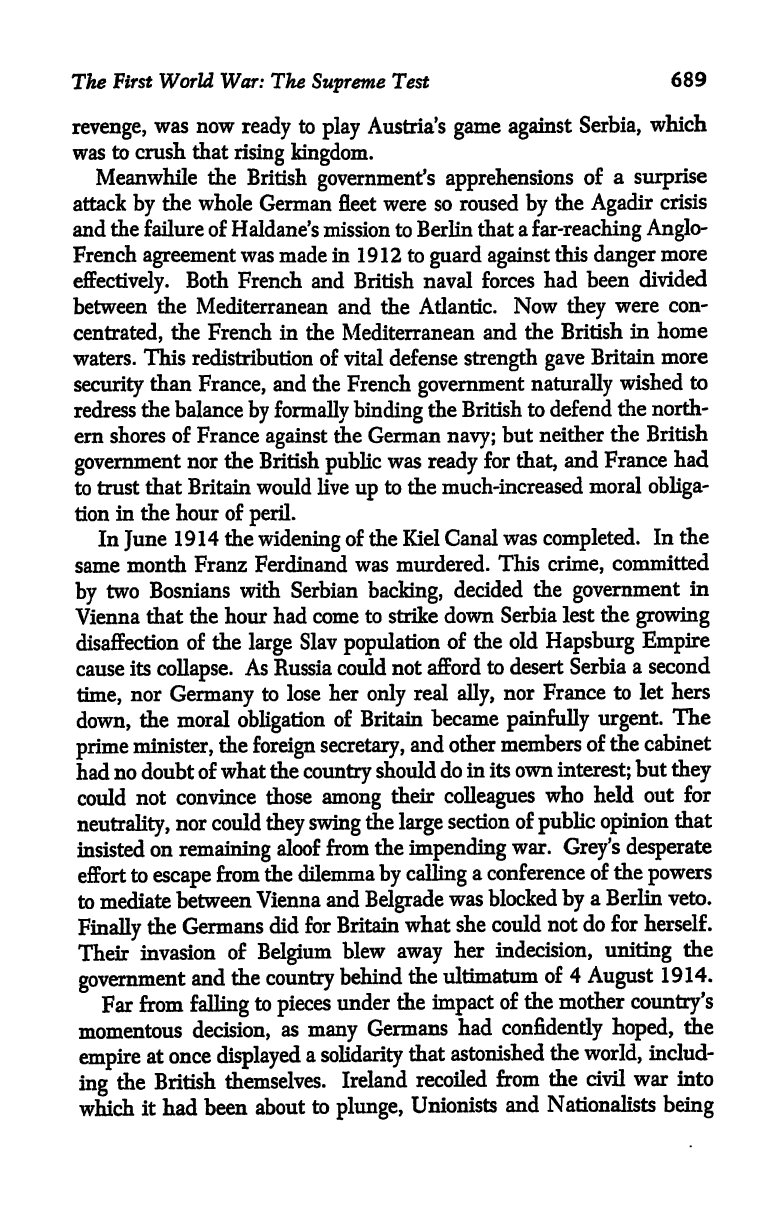
The
First World War: The
Supreme
Test
689
revenge,
was now
ready
to
play
Austria's
game
against
Serbia,
which
was
to
crush
that
rising
kingdom.
Meanwhile
the
British
government's
apprehensions
of
a
surprise
attack
by
the
whole
German fleet were so
roused
by
the
Agadir
crisis
and
the failure
of
Haldane's mission
to
Berlin
that
a
far-reaching
Anglo-
French
agreement
was
made
in
1912 to
guard against
this
danger
more
effectively.
Both
French and
British
naval forces
had
been
divided
between
the
Mediterranean
and
the
Atlantic.
Now
they
were
con-
centrated,
the French in
the
Mediterranean
and
the
British
in home
waters.
This
redistribution of vital
defense
strength
gave
Britain
more
security
than
France,
and
the French
government
naturally
wished
to
redress
the balance
by
formally
binding
the
British to
defend
the
north-
ern shores
of France
against
the German
navy;
but
neither
the British
government
nor the
British
public
was
ready
for
that,
and France
had
to
trust
that Britain
would live
up
to
the
much-increased
moral
obliga-
tion
in
the
hour of
peril.
In
June
1914 the
widening
of the
Kiel
Canal
was
completed.
In
the
same
month
Franz
Ferdinand
was
murdered.
This
crime,
committed
by
two
Bosnians
with Serbian
backing,
decided
the
government
in
Vienna
that the
hour had come
to
strike
down
Serbia
lest
the
growing
disaffection
of the
large
Slav
population
of the old
Hapsburg
Empire
cause
its
collapse.
As Russia
could
not
afford
to desert Serbia
a
second
time,
nor
Germany
to
lose
her
only
real
ally,
nor
France to let
hers
down,
the
moral
obligation
of
Britain became
painfully
urgent.
The
prime
minister,
the
foreign
secretary,
and other
members of
the
cabinet
had
no
doubt
of
what
the
country
should
do
in
its own
interest;
but
they
could
not
convince
those
among
their
colleagues
who held
out for
neutrality,
nor could
they swing
the
large
section
of
public
opinion
that
insisted
on
remaining
aloof
from
the
impending
war.
Grey's desperate
effort
to
escape
from
the dilemma
by
calling
a conference
of
the
powers
to mediate
between
Vienna
and
Belgrade
was blocked
by
a Berlin veto.
Finally
the
Germans
did
for
Britain
what
she could
not do
for
herself.
Their
invasion
of
Belgium
blew
away
her
indecision,
uniting
the
government
and the
country
behind
the
ultimatum
of
4
August
1914.
Far
from
falling
to
pieces
under
the
impact
of
the
mother
country's
momentous
decision,
as
many
Germans
had
confidently
hoped,
the
empire
at once
displayed
a
solidarity
that
astonished
the
world,
includ-
ing
the
British
themselves.
Ireland
recoiled
from
the
civil
war into
which
it
had been
about
to
plunge,
Unionists
and
Nationalists
being
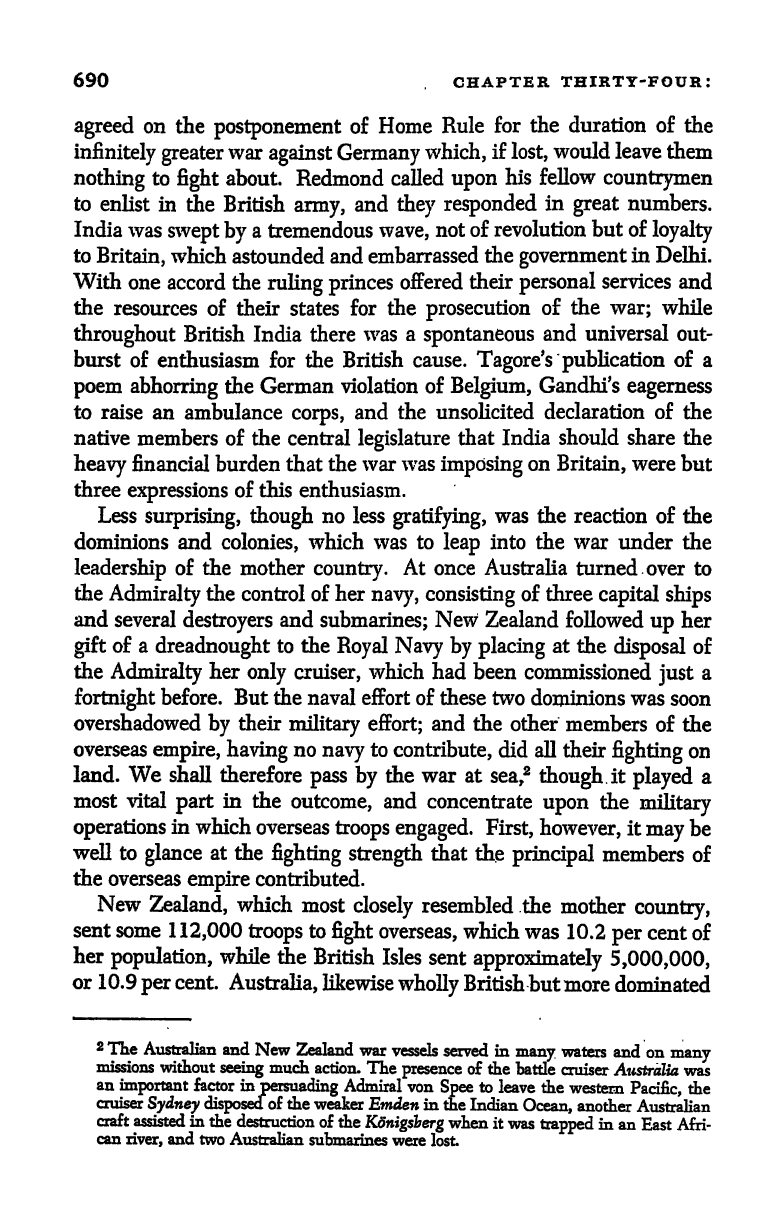
690
.
CHAPTER
THIRTY-FOUR:
agreed
on
the
postponement
of
Home
Rule
for
the duration of
the
infinitely
greater
war
against
Germany
which,
if
lost,
would leave
them
nothing
to
fight
about. Redmond
called
upon
his
fellow
countrymen
to
enlist in the
British
army,
and
they
responded
in
great
numbers.
India
was
swept by
a
tremendous
wave,
not of
revolution but of
loyalty
to
Britain,
which
astounded
and
embarrassed
the
government
in
Delhi.
With
one
accord
the
ruling
princes
offered
their
personal
services
and
the
resources
of
their
states
for
the
prosecution
of
the
war;
while
throughout
British India
there
was
a
spontaneous
and
universal
out-
burst of
enthusiasm for the British
cause.
Tagore's
publication
of
a
poem
abhorring
the German
violation of
Belgium,
Gandhi's
eagerness
to raise an
ambulance
corps,
and the unsolicited
declaration of
the
native
members of the
central
legislature
that India
should
share
the
heavy
financial burden
that the
war
was
imposing
on
Britain,
were
but
three
expressions
of this enthusiasm.
Less
surprising, though
no less
gratifying,
was the
reaction of the
dominions and
colonies,
which
was to
leap
into the war
under
the
leadership
of the mother
country.
At once Australia
turned. over
to
the
Admiralty
the
control
of her
navy, consisting
of three
capital
ships
and
several
destroyers
and
submarines;
New
Zealand
followed
up
her
gift
of a
dreadnought
to
the
Royal Navy by
placing
at
the
disposal
of
the
Admiralty
her
only
cruiser,
which
had been
commissioned
just
a
fortnight
before. But the
naval effort of these two
dominions
was
soon
overshadowed
by
their
military
effort;
and
the
other
members
of the
overseas
empire,
having
no
navy
to
contribute,
did all their
fighting
on
land. We
shall therefore
pass by
the
war
at
sea,
2
though
it
played
a
most
vital
part
in
the
outcome,
and
concentrate
upon
the
military
operations
in
which
overseas
troops
engaged.
First,
however,
it
may
be
well to
glance
at
the
fighting
strength
that the
principal
members
of
the
overseas
empire
contributed.
New
Zealand,
which
most
closely
resembled the
mother
country,
sent some 1
12,000
troops
to
fight
overseas,
which was
10.2
per
cent
of
her
population,
while the
British Isles
sent
approximately
5,000,000,
or
10.9
per
cent.
Australia,
likewise
wholly
British
but
more
dominated
2
The
Australian and
New Zealand
war
vessels
served in
many,
waters
and
on
many
missions
without
seeing
much
action.
The
presence
of the
battle
cruiser
Australia
was
an
important
factor in
persuading
Admiral
von
Spee
to
leave the
western
Pacific,
the
cruiser
Sydney disposed
of the
weaker
Emden
in the
Indian
Ocean,
another
Australian
craft
assisted in
the
destruction of
the
Konigsberg
when
it
was
trapped
in
an
East Afri-
can
river,
and
two
Australian
submarines
were
lost.
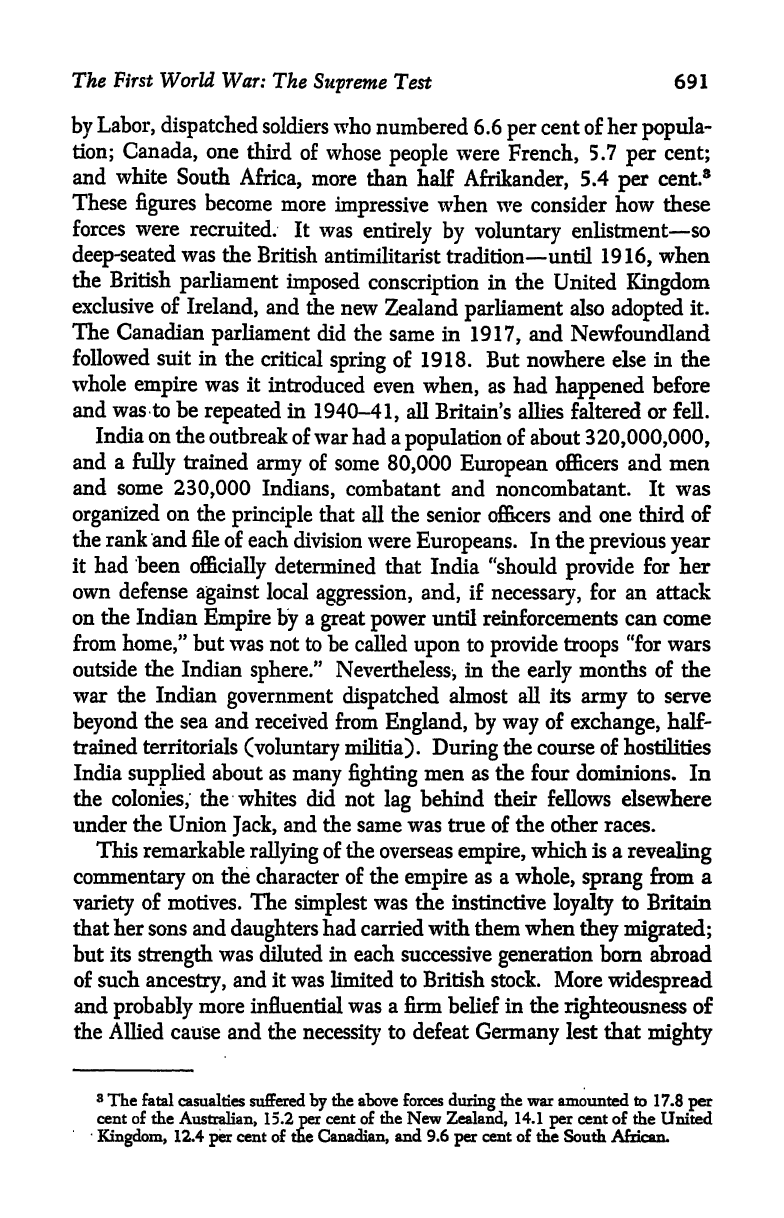
The
First
World
War:
The
Supreme
Test
691
by
Labor,
dispatched
soldiers
who
numbered
6.6
per
cent of
her
popula-
tion; Canada,
one
third
of
whose
people
were
French,
5.7
per
cent;
and
white
South
Africa,
more
than
half
Afrikander,
5.4
per
cent.
3
These
figures
become
more
impressive
when
we
consider
how
these
forces
were
recruited.
It
was
entirely by
voluntary
enlistment
so
deep-seated
was
the
British
antimilitarist
tradition
until
1916,
when
the
British
parliament
imposed
conscription
in
the United
Kingdom
exclusive of
Ireland,
and
the
new
Zealand
parliament
also
adopted
it.
The
Canadian
parliament
did the same
in
1917,
and Newfoundland
followed
suit
in
the
critical
spring
of 1918. But nowhere else
in
the
whole
empire
was
it
introduced
even
when,
as
had
happened
before
and
was
to
be
repeated
in
1940-41,
all
Britain's
allies
faltered
or fell.
India
on
the
outbreak
of war
had a
population
of about
320,000,000,
and
a
fully
trained
army
of
some
80,000
European
officers
and
men
and some
230,000
Indians,
combatant
and
noncombatant.
It
was
organized
on
the
principle
that
all
the
senior officers and one third
of
the
rank
and file
of
each
division were
Europeans.
In
the
previous
year
it
had
been
officially
determined
that
India "should
provide
for
her
own
defense
against
local
aggression,
and,
if
necessary,
for
an
attack
on the Indian
Empire by
a
great
power
until reinforcements
can come
from
home,"
but
was
not
to be called
upon
to
provide troops
"for
wars
outside
the
Indian
sphere."
Nevertheless,
in the
early
months of the
war the
Indian
government
dispatched
almost
all
its
army
to serve
beyond
the sea
and
received from
England,
by way
of
exchange,
half-
trained territorials
(voluntary
militia).
During
the
course
of hostilities
India
supplied
about
as
many
fighting
men as the four
dominions. In
the
colonies,
the
whites did not
lag
behind their fellows elsewhere
under
the Union
Jack,
and the
same was true of
the other
races.
This remarkable
rallying
of
the overseas
empire,
which is a
revealing
commentary
on
the character of the
empire
as
a
whole,
sprang
from
a
variety
of motives. The
simplest
was the
instinctive
loyalty
to
Britain
that her
sons and
daughters
had carried with them
when
they
migrated;
but its
strength
was
diluted
in each
successive
generation
born
abroad
of such
ancestry,
and
it was
limited to British
stock.
More
widespread
and
probably
more influential
was
a firm
belief
in
the
righteousness
of
the
Allied
cause
and
the
necessity
to
defeat
Germany
lest
that
mighty
3
The
fatal
casualties
suffered
by
the above forces
during
the
war amounted
to
17.8
per
cent of
the
Australian,
15.2
per
cent
of
the
New
Zealand,
14.1
per
cent of
the United
Kingdom,
12.4
per
cent of the
Canadian,
and 9.6
per
cent of the
South
African.
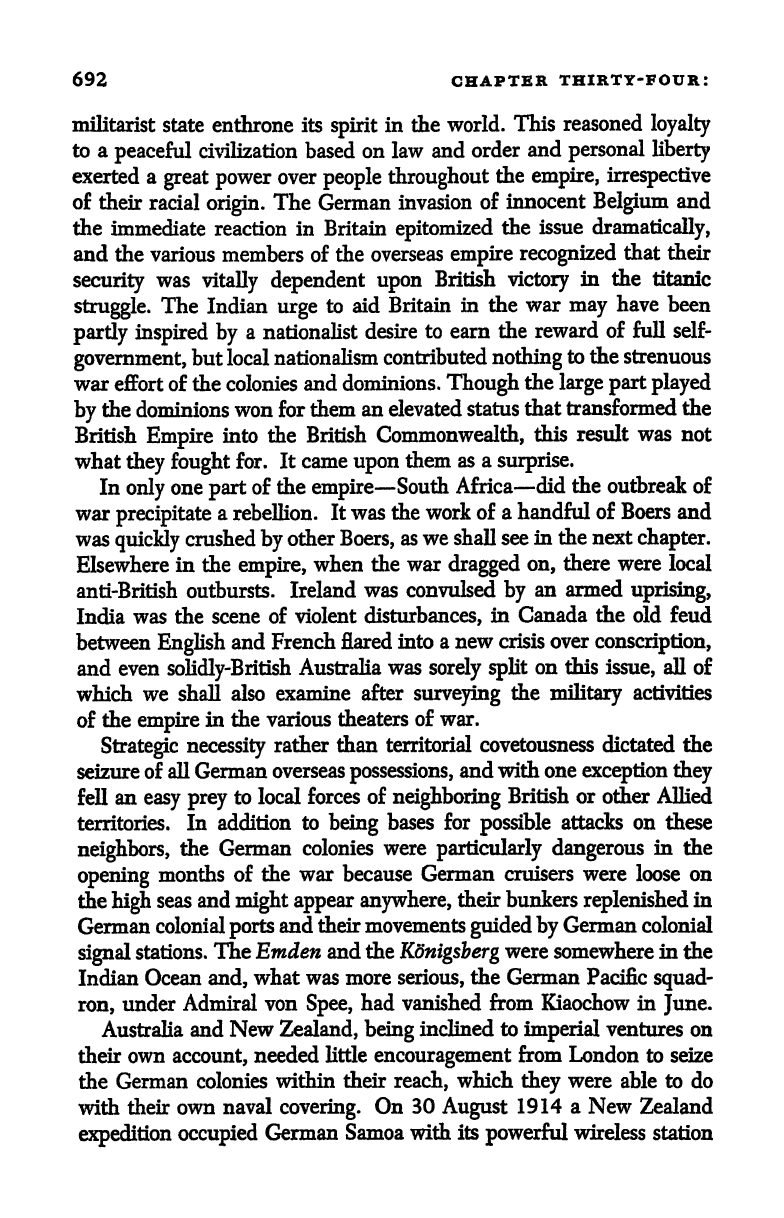
692 CHAPTER
THIRTY-FOUR:
militarist
state enthrone its
spirit
in the world.
This
reasoned
loyalty
to
a
peaceful
civilization
based
on law
and
order
and
personal
liberty
exerted a
great
power
over
people
throughout
the
empire,
irrespective
of
their
racial
origin.
The
German
invasion
of
innocent
Belgium
and
the
immediate
reaction
in Britain
epitomized
the
issue
dramatically,
and
the
various members of
the overseas
empire
recognized
that their
security
was
vitally
dependent
upon
British
victory
in the
titanic
struggle.
The
Indian
urge
to
aid
Britain
in the
war
may
have
been
partly inspired by
a
nationalist
desire
to earn
the reward
of full
self-
government,
but
local
nationalism
contributed
nothing
to
the
strenuous
war
effort
of
the colonies
and
dominions.
Though
the
large
part played
by
the
dominions
won for
them
an elevated
status
that
transformed the
British
Empire
into the
British
Commonwealth,
this result
was
not
what
they
fought
for. It
came
upon
them
as a
surprise.
In
only
one
part
of
the
empire
South
Africa
did
the outbreak
of
war
precipitate
a
rebellion.
It
was the
work
of a
handful
of Boers
and
was
quickly
crushed
by
other
Boers,
as
we
shall
see
in the
next
chapter.
Elsewhere
in the
empire,
when
the
war
dragged
on,
there
were
local
anti-British
outbursts.
Ireland
was
convulsed
by
an armed
uprising,
India
was
the
scene
of
violent
disturbances,
in Canada
the
old feud
between
English
and French
flared
into
a new crisis over
conscription,
and even
solidly-British
Australia
was
sorely
split
on this
issue,
all
of
which
we shall
also examine
after
surveying
the
military
activities
of
the
empire
in the various
theaters
of war.
Strategic
necessity
rather than territorial
covetousness
dictated the
seizure
of
all German
overseas
possessions,
and
with
one
exception they
fell
an
easy prey
to
local forces
of
neighboring
British or other
Allied
territories.
In addition
to
being
bases for
possible
attacks on
these
neighbors,
the
German
colonies
were
particularly dangerous
in
the
opening
months
of the
war
because
German
cruisers were
loose
on
the
high
seas
and
might
appear
anywhere,
their bunkers
replenished
in
German
colonial
ports
and their movements
guided
by
German colonial
signal
stations.
The
Emden
and
the
Konigsberg
were
somewhere in
the
Indian
Ocean
and,
what was more
serious,
the German
Pacific
squad-
ron,
under
Admiral von
Spee,
had vanished
from
Kiaochow in
June.
Australia
and New
Zealand,
being
inclined to
imperial
ventures on
their own
account,
needed little
encouragement
from London
to seize
the
German
colonies
within
their
reach,
which
they
were able to
do
with
their own
naval
covering.
On
30
August
1914
a New
Zealand
expedition
occupied
German
Samoa
with
its
powerful
wireless station
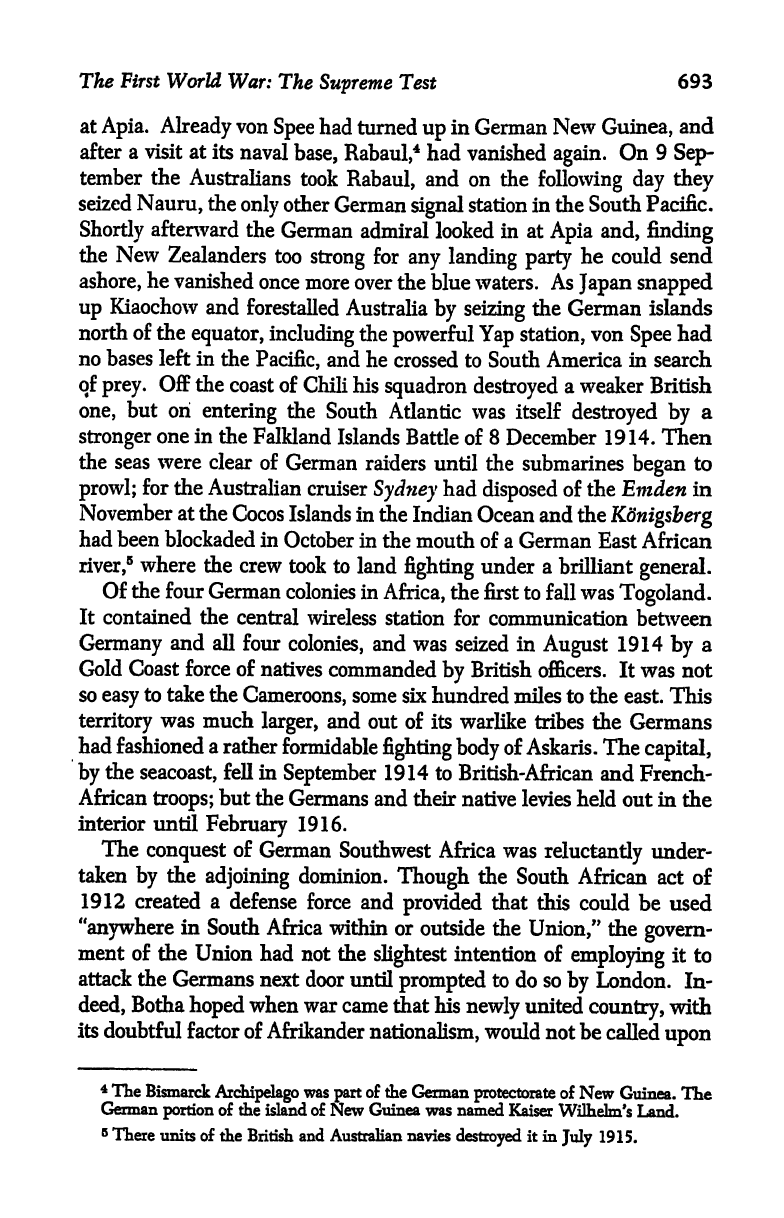
The
First
World
War:
The
Supreme
Test
693
at
Apia. Already
von
Spec
had turned
up
in
German
New
Guinea,
and
after
a
visit
at
its
naval
base, Rabaul,
4
had
vanished
again.
On
9
Sep-
tember
the
Australians
took
Rabaul,
and
on
the
following
day
they
seized
Nauru,
the
only
other
German
signal
station in the
South
Pacific.
Shortly
afterward
the
German
admiral looked
in
at
Apia
and,
finding
the
New
Zealanders
too
strong
for
any
landing
party
he
could
send
ashore,
he
vanished
once more over
the
blue
waters. As
Japan
snapped
up
Kiaochow
and
forestalled Australia
by seizing
the
German
islands
north
of
the
equator,
including
the
powerful Yap
station,
von
Spee
had
no bases left in
the
Pacific,
and
he
crossed to South
America
in search
of
prey.
Off the
coast
of
Chili
his
squadron
destroyed
a weaker British
one,
but on
entering
the
South
Atlantic
was
itself
destroyed by
a
stronger
one
in
the
Falkland Islands
Battle
of
8
December
1914. Then
the seas were
clear
of
German
raiders
until the submarines
began
to
prowl;
for the
Australian
cruiser
Sydney
had
disposed
of
the Emden in
November at
the
Cocos
Islands in die
Indian
Ocean and the
Kdnigsberg
had
been
blockaded in
October in
the mouth of a
German East
African
river,
5
where
the crew
took to
land
fighting
under
a
brilliant
general.
Of
the four
German
colonies in
Africa,
the
first to
fall was
Togoland.
It
contained the
central
wireless
station
for communication
between
Germany
and
all
four
colonies,
and was
seized in
August
1914
by
a
Gold
Coast force of
natives
commanded
by
British
officers. It was not
so
easy
to
take
the
Cameroons,
some
six
hundred miles to the
east.
This
territory
was
much
larger,
and
out
of its
warlike tribes
the
Germans
had
fashioned
a
rather
formidable
fighting
body
of Askaris.
The
capital,
by
the
seacoast,
fell
in
September
1914 to
British-African
and French-
African
troops;
but
the
Germans
and
their
native
levies
held out in
the
interior
until
February
1916.
The
conquest
of
German
Southwest Africa
was
reluctantly
under-
taken
by
the
adjoining
dominion.
Though
the
South
African act
of
1912
created
a
defense
force
and
provided
that
this
could
be
used
"anywhere
in
South
Africa
within
or
outside the
Union,"
the
govern-
ment
of
the Union
had not the
slightest
intention
of
employing
it to
attack the
Germans
next
door until
prompted
to
do
so
by
London.
In-
deed,
Botha
hoped
when war came
that his
newly
united
country,
with
its
doubtful
factor of
Afrikander
nationalism,
would
not be
called
upon
4
The
Bismarck
Archipelago
was
part
of
the German
protectorate
of
New
Guinea.
The
German
portion
of
the
island of
New
Guinea
was named
Kaiser
Wilhelm's
Land.
B
There
units of
the
British
and
Australian navies
destroyed
it in
July
1915.
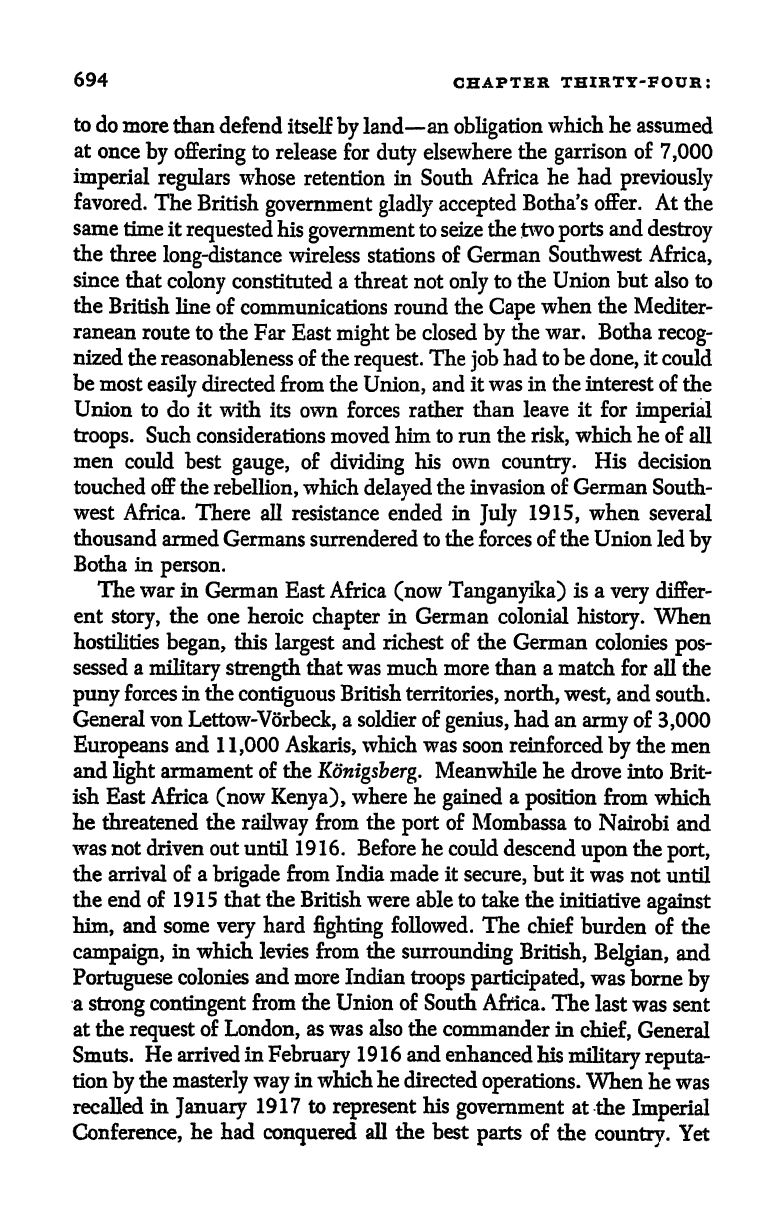
694
CHAPTER
THIRTY-FOUR:
to
do
more
than
defend
itself
by
land
an
obligation
which he
assumed
at
once
by
offering
to release
for
duty
elsewhere
the
garrison
of
7,000
imperial
regulars
whose
retention
in
South
Africa
he had
previously
favored.
The
British
government
gladly accepted
Botha's offer.
At
the
same
time
it
requested
his
government
to
seize the
two
ports
and
destroy
the
three
long-distance
wireless stations
of
German
Southwest
Africa,
since
that
colony
constituted
a
threat not
only
to
the
Union but
also
to
the
British line
of
communications round
the
Cape
when the
Mediter-
ranean
route
to
the
Far
East
might
be
closed
by
the
war.
Botha
recog-
nized
the reasonableness of the
request.
The
job
had
to
be
done,
it
could
be
most
easily
directed
from
the
Union,
and
it
was in the
interest of
the
Union
to
do
it
with its
own
forces
rather
than
leave
it
for
imperial
troops.
Such
considerations moved
him to run
the
risk,
which he
of
all
men
could best
gauge,
of
dividing
his
own
country.
His
decision
touched
off
the
rebellion,
which
delayed
the invasion
of German
South-
west
Africa. There
all resistance ended
in
July
1915,
when
several
thousand
armed
Germans surrendered
to the
forces
of the
Union
led
by
Botha
in
person.
The war
in
German
East
Africa
(now
Tanganyika)
is a
very
differ-
ent
story,
the
one heroic
chapter
in
German colonial
history.
When
hostilities
began,
this
largest
and richest of
the
German
colonies
pos-
sessed
a
military
strength
that
was much more than a
match
for
all the
puny
forces in
tie
contiguous
British
territories,
north, west,
and
south.
General von
Lettow-Vorbeck,
a soldier of
genius,
had
an
army
of
3,000
Europeans
and 1
1,000
Askaris,
which was
soon
reinforced
by
the
men
and
light
armament
of
the
Konigsberg.
Meanwhile
he
drove
into Brit-
ish East
Africa
(now
Kenya),
where
he
gained
a
position
from
which
he threatened the
railway
from the
port
of Mombassa
to
Nairobi
and
was not driven
out
until
1916.
Before he
could descend
upon
the
port,
the
arrival of
a
brigade
from India made
it
secure,
but it
was
not
until
the end
of
1915 that the British were
able
to
take
the
initiative
against
him,
and
some
very
hard
fighting
followed.
The
chief
burden
of the
campaign,
in
which levies
from the
surrounding
British,
Belgian,
and
Portuguese
colonies
and
more Indian
troops
participated,
was
borne
by
a
strong
contingent
from
the Union
of South
Africa.
The
last
was sent
at
the
request
of
London,
as
was also
the
commander
in
chief,
General
Smuts.
He arrived
in
February
1916
and
enhanced his
military
reputa-
tion
by
the
masterly way
in
which
he
directed
operations.
When he
was
recalled
in
January
1917
to
represent
his
government
at
the
Imperial
Conference,
he
had
conquered
all
the
best
parts
of
the
country.
Yet
